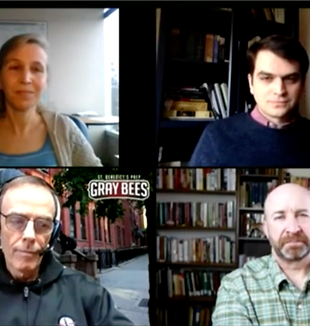
New York Encounter, Day 3: Lessons Learned
“Was it really worth it to go through this whole experience?” moderator and high school teacher Patrick Tommasi posed to a group of educators during Sunday afternoon’s panel discussion, “Lessons Learned.” With the pandemic of 2020 introducing challenges completely new to most classrooms around the world, the online panel of witnesses--a mix of professors, administrators, teachers and students--gave their experiences of education in the past year.
Tommasi shared the proposal of an eighth grade student back in March: to just postpone the school year until COVID was over. So, has the last eleven months of virtual learning, in-person with appropriate PPE, or a mix of both, been “worth it” for the millions of students and teachers impacted worldwide?
“Is the cross worth it? Is suffering meaningful or is suffering absurd?” responded Reverend Edwin Leahy, O.S.B., high school headmaster of St. Benedict’s Preparatory School in Newark, New Jersey, reminding us that, in the Christian tradition, with death comes life. He reiterated his mission to be the sign of faith by promoting opportunities for community even if the visible, physical community might be gone. Fr. Ed described that this is what the hearts of his students are made for--the communal love modeled by the Trinity. Some “solutions” his school found to provide community are things they’d like to keep going. For example, elderly alumni had the opportunity to view virtual “morning meetings.” Over time, if particular alumni weren’t around some mornings, students of the school were calling to make sure they were okay.
“Do you understand my suffering? Do I understand the suffering of the person on the other side of the Zoom chat?” Damian Bacich, professor of Ibero-American Literatures at San Jose State University found that we were all living challenges too big to face. He gave examples of students trying to learn online while picking fruits and vegetables in the fields. One student was deployed with the National Guard. Getting to know his students in a deeper way opens moments of tenderness for the other and moments of hope that within our reality we can still find glimpses of what is good. The role of educators is to express that life is still good--worth living and engaging in.
Michelle Ratti, high school science and language teacher in Kensington, Maryland, was surprised by what was left after being stripped of her joy and efficacy during the time of pandemic and watching her students being stripped of their friendships and community. “At first I thought it was just frustration and drudgery. . . . What I discovered--that, having been stripped of everything, I discovered I love them.” By asking God for her day to be made worthwhile, she found a great energy to continue to give of herself, even when frustrated, and has been growing in tremendous affection for her students during this time.
Giving a student’s perspective, Peter Fields, Ph.D. candidate in physics at the University of Chicago, acknowledged the unique difficulties of online learning: lack of motivation, technical problems, distraction, missing the support of friends and mentors, etc. But, was it worth it? “Surprisingly, I did experience a grace of renewed interest in what I was studying. . . ultimately, a resilient interest in what I studied,” he said.
There are still big question marks left on how to move forward to promote relationships between teachers and students while continuing to elicit high levels of quality teaching and student engagement in a virtual environment. “We’re still in this. It’s a little bit hard to reflect back when you’re still driving down the road at 80 miles per hour,” Bacich noted when talking about his responsibilities as department chair.
As an educator in Catholic schools for fifteen years, it is helpful for me to answer the question, “Has this time been worth it?” Only personal verification from those leading in the classroom can communicate an adequate response to the students in front of us. When students can see that their teachers believe this time is given and meaningful, it is then that they are motivated to continue on.
Education, as Father Giussani taught, is an introduction to reality. Now is the privileged moment for educators and students alike to verify reality as something meaningful for us, no matter how challenging the circumstances.